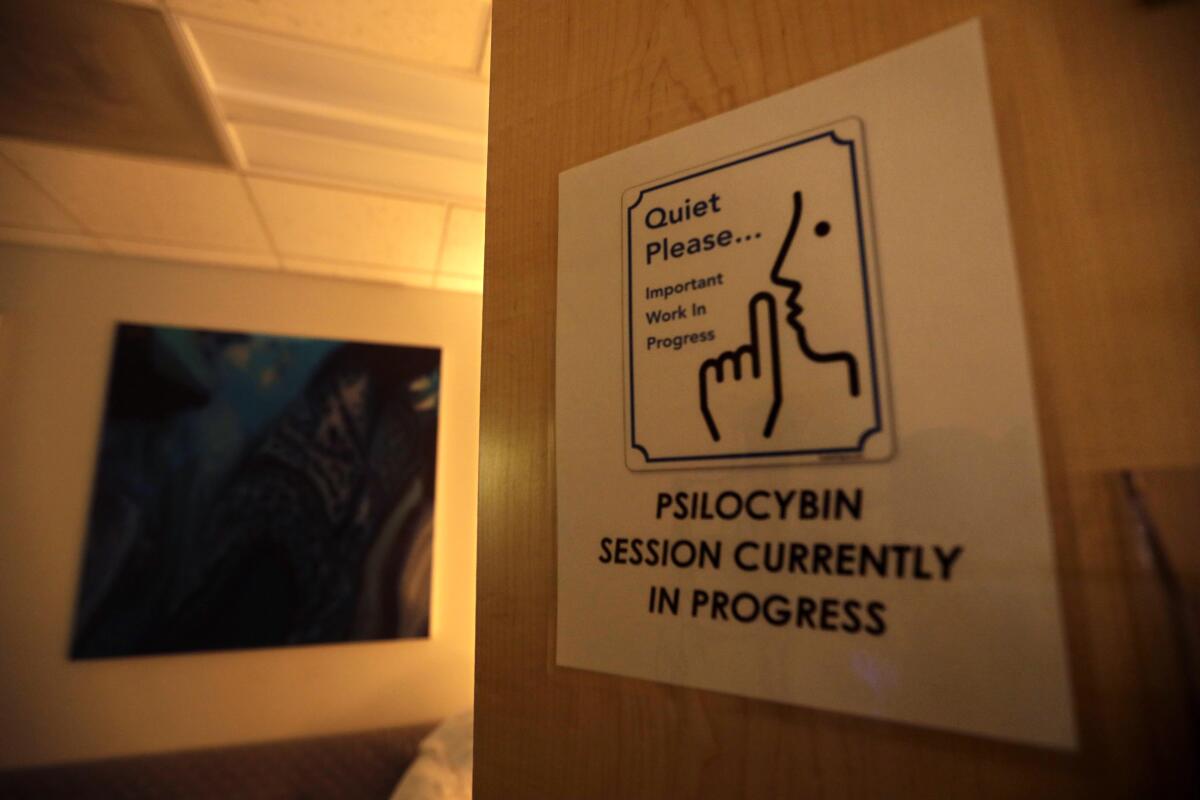‘Magic mushrooms’ would be decriminalized in California under new bill

- Share via
The possession and personal use of certain psychedelic drugs such as “magic mushrooms” and ayahuasca would be decriminalized in California under a bill introduced Monday backed by mental health professionals and veterans groups.
Supporters of Senate Bill 58 say that the legislation is a step toward ending California’s “war on drugs” and that decriminalizing psychedelics could pave the way for better treatment options to alleviate substance use disorders and other health issues such as anxiety and depression. The bill will likely face opposition among law enforcement groups, which have raised concerns in recent years with the possible public safety risks associated with hallucinogens.
State Sen. Scott Wiener (D-San Francisco) reintroduced the bill roughly four months after an earlier version was gutted in a key state Assembly committee amid opposition from law enforcement and a handful of Democrats who joined Republicans in voting against it.
The new proposal excludes synthetic psychedelics including LSD and MDMA, known commonly as ecstasy, which were included in the previous iteration.
SB 58 would allow only plant-based hallucinogens, such as psilocybin, the active ingredient in “magic mushrooms,” and dimethyltryptamine, or DMT, which is found in some plants used to brew ayahuasca. Other naturally occurring psychedelics that would be allowed under the bill include ibogaine, a psychoactive alkaloid found in the iboga shrub, and mescaline found in cacti other than peyote.
“Psychedelics have tremendous capacity to help people heal, but right now, using them is a criminal offense,” Wiener said in a statement. “These drugs literally save lives and are some of the most promising treatments we have for PTSD, anxiety, depression, and addiction.”
A handful of California cities have already decriminalized the possession of natural psychedelics, including San Francisco, Santa Cruz and Oakland, and voters in Oregon and Colorado have recently approved similar ballot measures. Mental health professionals and other advocates supporting the statewide proposal say a more widespread lifting of criminal sanctions against the drugs would help research and treatment.
Dr. Sarah Abedi, an emergency medicine physician and a facilitator at the Treatment and Research in Psychedelics Program at the Pacific Brain Health Center, said decriminalizing psychedelics can help reduce the shame and stigma often associated with mental health issues and treatment. Abedi said the bill could help pave way for greater education on and more research of psychedelics to determine how effective they are at treating issues that range from opioid addiction to post-traumatic stress disorder in veterans.
“Historically, some people seek out psychedelics for healing when other conventional treatments have failed them,” Abedi said. Psychedelics can help bring “material to the surface that needs to come up for processing,” Abedi said, which helps people address the root causes of some of their health concerns.
“Through more destigmatization, decriminalization, education, research, we can start learning more about these treatments,” Abedi said.
Narrowing the bill could help convince some skeptics, but the measure’s proponents are still likely to face public safety questions, particularly from law enforcement.
“Without more evidence that these hallucinogenic drugs are no more dangerous than cannabis, we cannot support legalizing them,” the California District Attorneys Assn. wrote in opposition to the previous version of the bill. “Hallucinations can be dangerous to users and bystanders alike, and it is not clear that the benefit of legalizing these drugs outweighs the cost to the common welfare.”
Decriminalization is different from full legalization, meaning these psychedelics still wouldn’t be treated like marijuana in California.
The bill wouldn’t authorize the sale of these psychedelics in dispensaries, or at all, but would rather be a directive that police cannot arrest individuals for possessing or personally using limited amounts of psychedelics. It would only remove the criminal penalty for personal possession or use of small amounts of certain psychedelics, and still prohibit the sale of these drugs to minors.
The bill will face its first committee hearing and legislative vote in the spring, after the Legislature reconvenes for the 2023-24 session in January.
More to Read
Sign up for Essential California
The most important California stories and recommendations in your inbox every morning.
You may occasionally receive promotional content from the Los Angeles Times.











